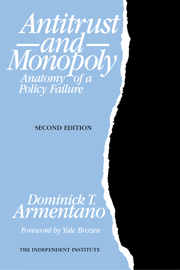Are we headed for an economic recession? Probably. What can we do about it? Not much.
The 5-year economic expansion initiated by tax reductions and lower interest rates has just about run its course. My guess is that the recession should begin in the first or second quarter of 2007 and run, if history is any guide, for about 18 months. Unfortunately for the Republicans, that would put the bulk of the decline well within the 2008 presidential race.
Economic expansions don’t end naturally, but are short-circuited by bad economic policy. The fact remains that the Federal Reserve kept interest rates too low for far too long following the recession of 2000-2001. This easy money policy fueled an unprecedented expansion in the housing industry both in supply and in price appreciation. Absent substantial improvements in productivity and real income for households, that bank-fueled expansion was simply not sustainable, long term.
When the Federal Reserve woke up last year and finally pushed rates up modestly, the housing expansion stalled. Since then, prices for homes and condominiums in many areas have been in near free-fall. In my estimation it will take years, not months, to work off the surplus national inventory and restore normalcy to the housing market. A “soft landing” is just not in the cards.
Sales of automobiles mirror housing sales (with a time lag) for several reasons. First, most new car purchases are financed, and higher interest rates slow the demand for cars and trucks. Second, and more importantly, declines in the value of housing produce what economists call a “negative wealth effect.” This means that we are more likely to purchase a new car (or a vacation condo) when our primary home is worth, say, $300,000 rather than, say, $175,000. As the value of our home adjusts downward, we feel “poorer” (even if we never sell), and we cut back on large purchases elsewhere. We are in the early stages of that adjustment now.
Financial markets are also signaling a possible near-term recession. Long-term (5-year) interest rates are now lower than short-term rates, and this so-called “inverted yield curve” often foretells economic troubles down the road. Normally there is an interest rate premium for lending long-term: long-term rates are usually higher than money lent for less than one year. When long-term rates are lower, it implies that the demand for long-term capital and investment is soft, and that the long-term business outlook is relatively bleak.
Is there any good news? Sure. Employment is strong, and people who work spend money and save for the future. And despite the problems, housing markets are working efficiently, which means that new construction is slowing markedly and used home prices are adjusting downward to reduce the unsold inventory. Ditto in autos, where major producers have announced production cuts, and where rebates and dealer-supported financing will clear backlog.
Also, unlike other recent recessions, most of our major corporations and financial institutions appear strong, with fairly solid balance sheets. Finally, the stock market has moved briskly higher in the last 6 months, counter-balancing, to some extent, the negative wealth effect in primary housing. If I’m right about the recession, however, this upward move in stock prices will also stall.
In short, we are headed (probably) into an extended period of relatively modest economic activity. We can avoid making the slowdown worse by steering clear of tax increases and higher minimum wages. Households with high leveraged debt and cyclical employment will be hit the hardest. The rest of us should muddle through in reasonably fine fashion.








